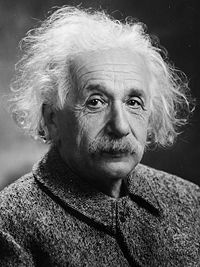Rest Mass Energy: Difference between revisions
| Line 19: | Line 19: | ||
<math> E/(c^2)=m</math> | <math> E/(c^2)=m</math> | ||
This is especially important because it says that all the energy, regardless of form, can be equated to mass | |||
===A Computational Model=== | ===A Computational Model=== | ||
Revision as of 00:11, 29 November 2015
Provide a brief summary of the page here
Rest Mass Energy
Work In Progress - Shiv Tailor HAI SHIV <3 -Alice Rest mass energy is the energy an object has when is not moving nor is it in a potential field. The famous equation
[math]\displaystyle{ E=mc^2 }[/math]
demonstrates the mass energy equivalence. What this equation means is that the Internal Energy (E) in Joules is equal to the mass (m) in kilograms times the speed of light (c) in meters per second squared.
This incredible relationship was shown by Albert Einstein in 1905.

A Mathematical Model
This is a very simple equation but it can be rewritten in many ways.
[math]\displaystyle{ E/(c^2)=m }[/math]
This is especially important because it says that all the energy, regardless of form, can be equated to mass
A Computational Model
How do we visualize or predict using this topic. Consider embedding some vpython code here Teach hands-on with GlowScript
Examples
Be sure to show all steps in your solution and include diagrams whenever possible
Simple
Middling
Difficult
Connectedness
- How is this topic connected to something that you are interested in?
- How is it connected to your major?
- Is there an interesting industrial application?
History
Put this idea in historical context. Give the reader the Who, What, When, Where, and Why.
See also
Are there related topics or categories in this wiki resource for the curious reader to explore? How does this topic fit into that context?
Further reading
Books, Articles or other print media on this topic
External links
Internet resources on this topic
References
This section contains the the references you used while writing this page